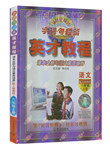阅读理解。
On the outside Betsy Lueth's school looks like any other in Minneapolis. Yet inside, it is Yinghua Academy,
a public school where elementary (小学) students study subjects ranging from math to American history in
Chinese.
Yinghua, the first such immersion (沉浸式) program in the Midwest is on the leading edge of a movement
that in recent years has seen Chinese language programs spread rapidly throughout the U.S.
The idea behind Yinghua is to introduce kids to the language and culture as early as possible-ideally, before
age 12. Kindergarteners and first graders are taught in Chinese and a single period of English is introduced in
second grade. By sixth grade, kids are learning half in English and half in Chinese, with the expectation of
fluency in both. In Yinghua's classrooms, the walls are covered not with ABCs but with pictures and Chinese
characters.
There are many challenges at Yinghua. Most teachers come from Taiwan or mainland China, and cultural
misunderstandings are very common. Lueth's teachers are learning to be tolerant of local customs-as well as
a lot more parental input than they are used to. "In China, teachers are respected. They are not questioned,"
says Luyi Lien, Yinghua's Taiwan-born director. "In America, parents are more expressive of their opinions."
Research has shown that in the long run, immersion programs can provide benefits, including more flexible,
creative thinking. Though students from the programs fall behind for a few years in English, by fifth grade
they perform as well as or better than their monolingual (单语言) peers on standardized reading and math tests.
For multicultural families, the psychological help can also be important. Lueth, a former teacher, co-founded
the school as a way to expose her adopted Chinese daughter Lucy to her native culture. Lucy used to be
annoyed when cousins asked why her skin color was different from theirs; before she started at Yinghua, she
resisted exploring anything related to China Now, Lueth says, Lucy proudly answers her cousins, "Yeah, I was
born in China."
1. Yinghua is different from other schools in Minneapolis in the way that _____.
A. it offers subjects to students mostly in Chinese
B. its language program is popular in the U.S.A.
C. kids there begin to learn Chinese at the age of 12
D. its students learn subjects half in English and half in Chinese
2. One of the challenges at Yinghua is that _____.
A. most parents do not respect its teachers
B. teachers need to get used to the local culture
C. its students are mostly from nontraditional families
D. there is misunderstanding between teachers and students
3. We can learn from the last paragraph that immersion program _____.
A. enables students pass tests more easily
B. benefits students in learning psychology
C. helps some students accept the local customs
D. contributes to the better development of students
4. Which of the following is TRUE according to the passage?
A. Teachers in Yinghua have difficulty in understanding the local culture.
B. Parents are discouraged to speak out their opinions of the school in Yinghua.
C. The students in Yinghua are expected to speak English and Chinese fluently.
D. Yinghua is the first school in the U.S.A. to introduce Chinese culture to students.

 字词句段篇系列答案
字词句段篇系列答案